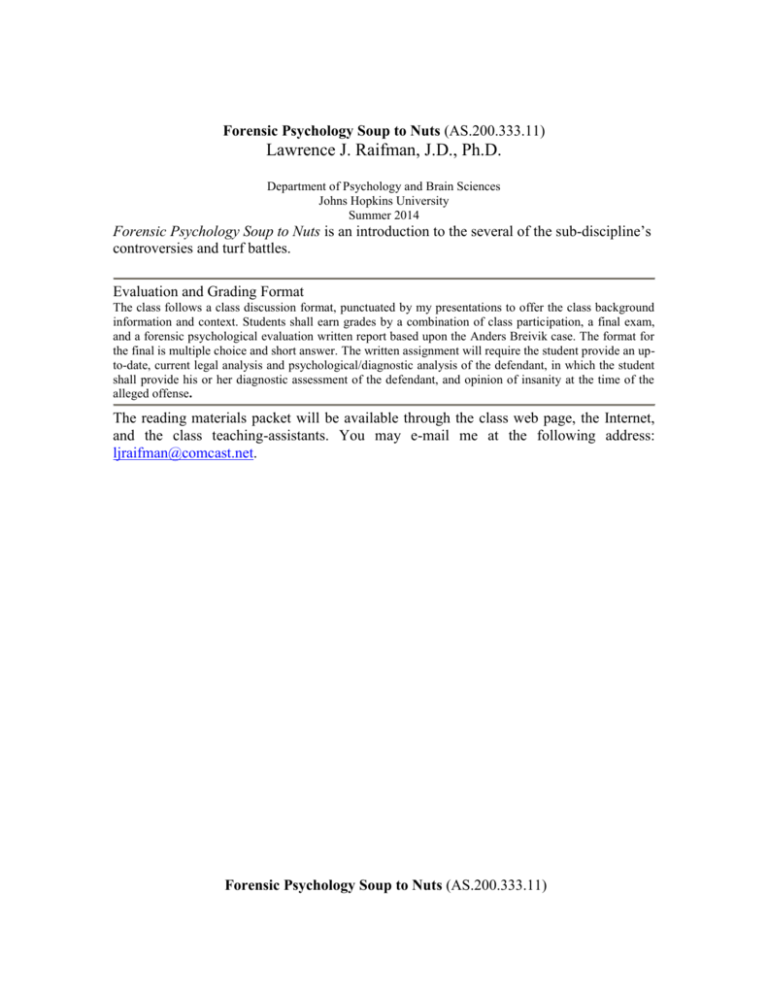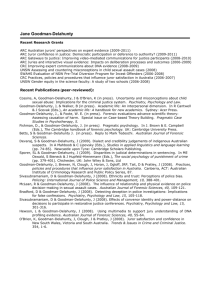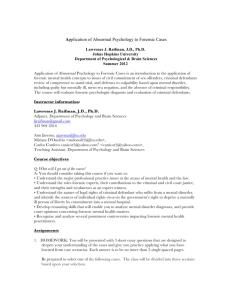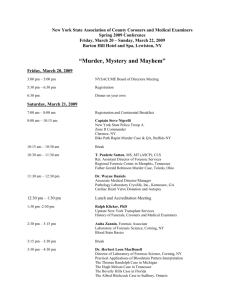Psychology and the Law: Clinical Applications
advertisement

Forensic Psychology Soup to Nuts (AS.200.333.11) Lawrence J. Raifman, J.D., Ph.D. Department of Psychology and Brain Sciences Johns Hopkins University Summer 2014 Forensic Psychology Soup to Nuts is an introduction to the several of the sub-discipline’s controversies and turf battles. Evaluation and Grading Format The class follows a class discussion format, punctuated by my presentations to offer the class background information and context. Students shall earn grades by a combination of class participation, a final exam, and a forensic psychological evaluation written report based upon the Anders Breivik case. The format for the final is multiple choice and short answer. The written assignment will require the student provide an upto-date, current legal analysis and psychological/diagnostic analysis of the defendant, in which the student shall provide his or her diagnostic assessment of the defendant, and opinion of insanity at the time of the alleged offense. The reading materials packet will be available through the class web page, the Internet, and the class teaching-assistants. You may e-mail me at the following address: ljraifman@comcast.net. Forensic Psychology Soup to Nuts (AS.200.333.11) Page 2 of 5 Forensic Psychology Soup to Nuts Lawrence J. Raifman, J.D., Ph.D. Johns Hopkins University Department of Psychological & Brain Sciences Summer 2014 SUMMER SEMESTER SCHEDULE I. Introduction 1. Introduction to our class project: Evaluating Andres Breivik 2. What is forensic psychology? How does it differ from clinical psychology? Jonas Rappeport, “Differences between forensic and general psychiatry,” American Journal of Psychiatry, Vol 139, p. 331-5, March 1982. Diagnostic and Statistical Manual of Mental Disorders, Fourth Edition Revised 3. How to read a legal opinion, how to evaluate a legal standard. Star v. Kentucky (Kentucky Supreme Court decision) American Law Institute Test for Criminal Responsibility 4. Targeting the mentally ill: Should mentally ill persons be permitted to purchase guns? Joseph R. Stimpson, “Bad Risk? An overview of laws prohibiting possession of firearms by individuals with a history of treatment for mental illness, Journal American Academy of Psychiatry & Law, Volume 35, p. 330-8, 2007. Virginia Firearms purchase eligibility Test Matthew Barakat, “Rules should have barred weapon purchase,” Washington Post, April 20, 2007 II. Punishment v. Coercing Rehabilitation 1. Policy analysis: Should Mentally ill defendants who commit crimes require punishment or treatment? D. J. Jaffe, “The Trouble with the Insanity Defense,” Wall Street Journal, March 25 2010. Yuval Melamed, “Mentally ill persons who commit crimes: punishment or treatment?” Journal of the American Academy of Psychiatry & Law, Volume 38, p. 100-3, 2010. 2. Appropriateness of “Guilty but Mentally Ill.” 3. Death penalty and competency to be executed: a problem of favored diagnoses. Richard Blanks & Debra A. Pinals. “Competency to be executed.” Journal of the American Academy of Psychiatry & Law, Volume 35, p. 381-5, 2007. Page 3 of 5 Forensic Psychology Soup to Nuts 4. Inventing diagnoses for civil commitment of rapists Thomas K Zander, “Commentary: Inventing Diagnosis for civil commitment of rapists,” Journal of the American Academy of Psychiatry & Law, Volume 36, p. 459-69, 2008. 5. The case of civil commitment of children----rehabilitation or punishment? Thomas S. Szasz, “American Association for the abolition of involuntary mental hospitalization,” Letters to the Editor, American Journal of Psychiatry, Vol 127, p. 134, June 1971. Judge David Bazelon Center for Mental Health Law, Position Statement on Involuntary Commitment, http://bazelon.org.gravitatehosting.com/Where-WeStand/Self-Determination/Forced-Treatment/Outpatient-and-CivilCommitment.aspx 6. Mass murder/suicide on university and high school campuses 1. Columbine High School massacre 2. Kip Kinkel, the killer at Thurston High, see PBS special 3. Cho, the Virginia Tech shooter 7. Compelling eating disorder treatment: is outpatient civil commitment applicable? Jacinta Tan, Anne Stewart, Raymond Fitzpatrick, Tony Hope, “Attitudes of patients with anorexia nervosa to compulsory treatment and coercion,” International Journal of Law and Psychiatry, Vol 33, p. 13-19, 2010. III. Insanity Defense Applications 1. Yates and Laney, post partum psychosis, mothers who kill their children in Texas 2. Involuntary Intoxication, and Idiosyncratic Intoxication (pathological intoxication); Final Analysis Film, Settled psychosis (Porreca v. State 433 A.2d 1204; Md. 1981, 3. Jeffrey Dahmer: sexual disorder and insanity 4. Battered Spouse, Battered Child syndrome http://www.crimelibrary.com/notorious_murders/famous/menendez/index_1.html Bobbitt case, and Iben Thamas v. U.S., 407 A.2nd 626, D.C. 1979, Remanded 455 A.2nd 893, 1983 5. Pathological gambling 6. Patty Hearst, Stockholm syndrome 7. Erotomania and Stalking (Stephen Spielberg and John Lennon stalkers) 8. Dissociative Disorders, (State v. Grimsley, 444 NE2nd 1071, 982) IV. Historic and current turf battles between doctors and lawyers when dealing with fundamentalist religious ideology, political extremism, delusional thinking, and criminality 1. Introduction: Rape Trauma Syndrome/False Memory Syndrome (Allewalt v. Maryland, 517 A.2d 741, Md. Ct. App. 1986, Baby case, 2007) Page 4 of 5 Forensic Psychology Soup to Nuts 2. Historic Cases a. Dan Sickles kills his wife’s paramour Mr. Key; Ezra Pound case Sam Roberts, “Sex, politics, and murder on the Potomac,” New York Times, March 1, 1992. Daniel Sickles Trial: 1859 - Cold-blooded Murder Or Justifiable Homicide? http://law.jrank.org/pages/2552/Daniel-Sickles-Trial-1859-Cold-BloodedMurder-or-Justifiable-Homicide.html b. Historic backdrop: John Brown’s insurrection Robert M De Witt, publisher, “The life, trial, and execution of Captain John Brown, The Avalon Project, Yale Law School, http://avalon.law.yale.edu/19th_century/john_brown.asp c. Presidential assassins: McKinley and Reagan i. McKinley’s assassination Mark Gado, “The Assassination of President William McKinley, http://www.trutv.com/library/crime/terrorists_spies/assassins/mckinley/3.htm l ii. John W. Hinckley assassination attempt on President Reagan 2. Ted Kaczynski’s terror campaign against technology 3. John Salvi’s terrorist campaign against abortion clinics Chip Berlet, “John Salvi Abortion Clinic Violent and Catholic Right Conspiracism: The Politics of John Salvi's Conspiracy Theories,” http://www.publiceye.org/rightist/sal vi.ht ml , March 19, 1996. PBS Frontline, “Murder on Abortion Row, John Salvi and the Insanity Defense, Jhttp://www.pbs.org/wgbh/pages/frontline/salvi/ 4. Ron and Dan Lafferty, double murder in the name of God Jon Krakauer, Under the Banner of Heaven: A story of violent faith, Doubleday, 2005. 5. Mitchell’s rape and abduction of Elizabeth Smart 6. Abdul Rahman, the Afghan Christian V. Case studies 1. Sgt. Hasan Akbar The 2005 case at Fort Bragg, N.C., case of Sgt. Hasan Akbar was convicted and sentenced to death for the attack upon members of the 101st Airborne Division at Camp Pennsylvania in Kuwait. Two officers were killed and 14 other soldiers were wounded in the rifle and grenade attack. Akbar attacked his fellow soldiers days before the soldiers were to move into Iraq — because he was concerned about U.S. troops killing fellow Muslims. A defense psychiatrist testified that Akbar suffered from psychiatric illness, paranoia and schizophrenia symptoms, but was legally sane. Page 5 of 5 Forensic Psychology Soup to Nuts 2. Zacarias Moussaoui, the 20th hijacker of 9/11 The case of Zacarias Moussaoui, trained in Afghanistan with al Qaeda, who came to American in 2001 and learned to fly airplanes in Minnesota, he was arrested prior to 9/11 in August 2001. The defendant was found to be qualified for the death penalty as a conspirator to 9/11, a claim that Moussaoui agreed to, indicating that he was planning to fly a plane into the White House. His defense team asserted he was mentally ill and insane. He alleged that his father abused him when he was a child in France. In court, he shouted, "Crazy or not crazy? That is the question." Was he delusional, schizophrenic or someone seeking martyrdom? 3. Maj Nidal Hasan, the Ft. Hood massacre The prosecution of Maj. Nidal Hasan, charged with 13 counts of premeditated murder and 32 counts of attempted premeditated murder in the Nov. 5 shooting on the Fort Hood Texas Army post. The Defendant Hasan was initially hospitalized in a San Antonio military hospital, being treated for injuries sustained by gunshot wounds that left him paralyzed. VI. Class Project: Andres Breivik The strength of the university depends on academic and personal integrity. In this course, you must be honest and truthful. Ethical violations include cheating on exams, plagiarism, reuse of assignments, improper use of the Internet and electronic devices, unauthorized collaboration, alteration of graded assignments, forgery and falsification, lying, facilitating academic dishonesty, and unfair competition. Report any violations you witness to the instructor. You may consult the associate dean of students and/or the chairman of the Ethics Board beforehand. See the guide on “Academic Ethics for Undergraduates” and the Ethics Board web site (http://ethics.jhu.edu) for more information.





